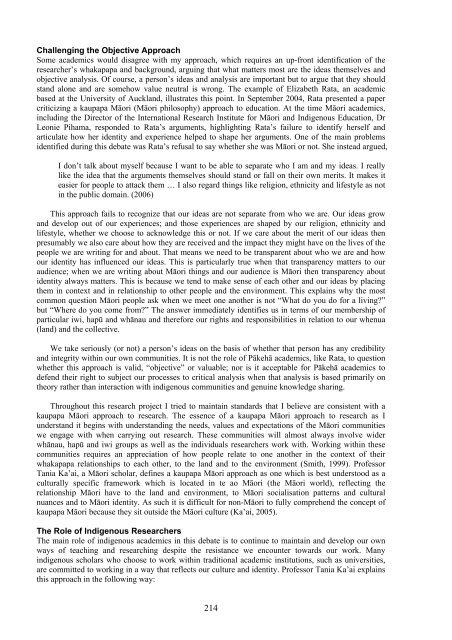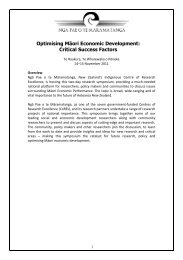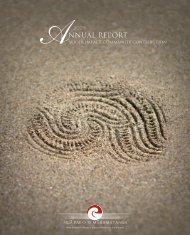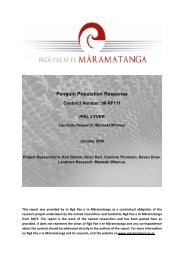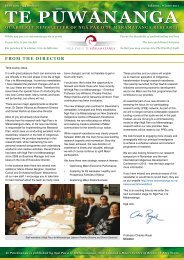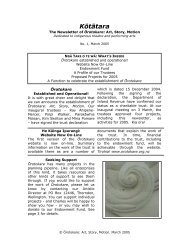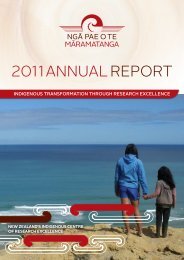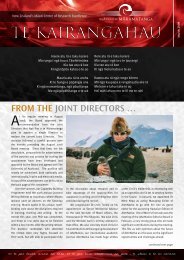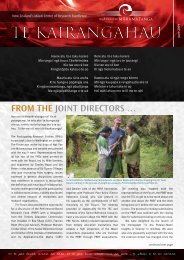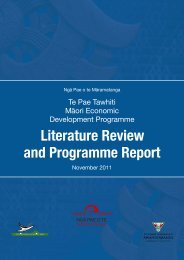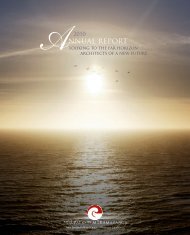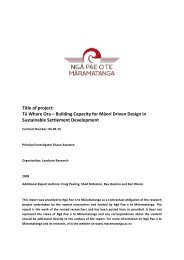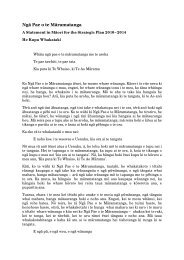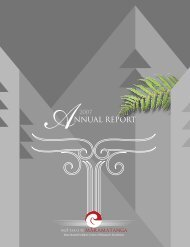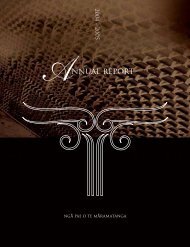traditional knowledge conference 2008 te tatau pounamu
traditional knowledge conference 2008 te tatau pounamu
traditional knowledge conference 2008 te tatau pounamu
Create successful ePaper yourself
Turn your PDF publications into a flip-book with our unique Google optimized e-Paper software.
Challenging the Objective ApproachSome academics would disagree with my approach, which requires an up-front identification of theresearcher’s whakapapa and background, arguing that what mat<strong>te</strong>rs most are the ideas themselves andobjective analysis. Of course, a person’s ideas and analysis are important but to argue that they shouldstand alone and are somehow value neutral is wrong. The example of Elizabeth Rata, an academicbased at the University of Auckland, illustra<strong>te</strong>s this point. In Sep<strong>te</strong>mber 2004, Rata presen<strong>te</strong>d a papercriticizing a kaupapa Māori (Māori philosophy) approach to education. At the time Māori academics,including the Director of the In<strong>te</strong>rnational Research Institu<strong>te</strong> for Māori and Indigenous Education, DrLeonie Pihama, responded to Rata’s arguments, highlighting Rata’s failure to identify herself andarticula<strong>te</strong> how her identity and experience helped to shape her arguments. One of the main problemsidentified during this deba<strong>te</strong> was Rata’s refusal to say whether she was Māori or not. She ins<strong>te</strong>ad argued,I don’t talk about myself because I want to be able to separa<strong>te</strong> who I am and my ideas. I reallylike the idea that the arguments themselves should stand or fall on their own merits. It makes i<strong>te</strong>asier for people to attack them … I also regard things like religion, ethnicity and lifestyle as notin the public domain. (2006)This approach fails to recognize that our ideas are not separa<strong>te</strong> from who we are. Our ideas growand develop out of our experiences; and those experiences are shaped by our religion, ethnicity andlifestyle, whether we choose to ac<strong>knowledge</strong> this or not. If we care about the merit of our ideas thenpresumably we also care about how they are received and the impact they might have on the lives of thepeople we are writing for and about. That means we need to be transparent about who we are and howour identity has influenced our ideas. This is particularly true when that transparency mat<strong>te</strong>rs to ouraudience; when we are writing about Māori things and our audience is Māori then transparency aboutidentity always mat<strong>te</strong>rs. This is because we <strong>te</strong>nd to make sense of each other and our ideas by placingthem in con<strong>te</strong>xt and in relationship to other people and the environment. This explains why the mostcommon question Māori people ask when we meet one another is not “What do you do for a living?”but “Where do you come from?” The answer immedia<strong>te</strong>ly identifies us in <strong>te</strong>rms of our membership ofparticular iwi, hapū and whānau and therefore our rights and responsibilities in relation to our whenua(land) and the collective.We take seriously (or not) a person’s ideas on the basis of whether that person has any credibilityand in<strong>te</strong>grity within our own communities. It is not the role of Pākehā academics, like Rata, to questionwhether this approach is valid, “objective” or valuable; nor is it acceptable for Pākehā academics todefend their right to subject our processes to critical analysis when that analysis is based primarily ontheory rather than in<strong>te</strong>raction with indigenous communities and genuine <strong>knowledge</strong> sharing.Throughout this research project I tried to maintain standards that I believe are consis<strong>te</strong>nt with akaupapa Māori approach to research. The essence of a kaupapa Māori approach to research as Iunderstand it begins with understanding the needs, values and expectations of the Māori communitieswe engage with when carrying out research. These communities will almost always involve widerwhānau, hapū and iwi groups as well as the individuals researchers work with. Working within thesecommunities requires an appreciation of how people rela<strong>te</strong> to one another in the con<strong>te</strong>xt of theirwhakapapa relationships to each other, to the land and to the environment (Smith, 1999). ProfessorTania Ka’ai, a Māori scholar, defines a kaupapa Māori approach as one which is best understood as aculturally specific framework which is loca<strong>te</strong>d in <strong>te</strong> ao Māori (the Māori world), reflecting therelationship Māori have to the land and environment, to Māori socialisation pat<strong>te</strong>rns and culturalnuances and to Māori identity. As such it is difficult for non-Māori to fully comprehend the concept ofkaupapa Māori because they sit outside the Māori culture (Ka’ai, 2005).The Role of Indigenous ResearchersThe main role of indigenous academics in this deba<strong>te</strong> is to continue to maintain and develop our ownways of <strong>te</strong>aching and researching despi<strong>te</strong> the resistance we encoun<strong>te</strong>r towards our work. Manyindigenous scholars who choose to work within <strong>traditional</strong> academic institutions, such as universities,are commit<strong>te</strong>d to working in a way that reflects our culture and identity. Professor Tania Ka’ai explainsthis approach in the following way:214


